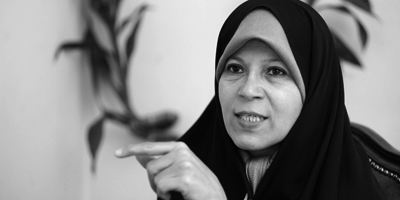FOREIGN POLICY, Sep 8, 2010- Faezeh Hashemi Rafsanjani, daughter of Iran’s powerful Ayatollah Akbar Hashemi Rafsanjani and a prominent advocate of the Green Movement, speaks to Foreign Policy about the future of Iran’s opposition and her (low) opinion of President Mahmoud Ahmadinejad.
Faezeh Hashemi Rafsanjani, 48, was one of Iran’s leading members of parliament from 1992 to 1996 and the founder and editor of Zan, Iran’s first-ever daily women’s newspaper. She is also the daughter of Ayatollah Akbar Hashemi Rafsanjani, one of the country’s most influential men and strongest opponents of President Mahmoud Ahmadinejad. During the widespread protests that followed Iran’s contested presidential election last year, Hashemi was a vocal supporter of the Green Movement and was briefly imprisoned by the Iranian government for her activism. She spoke to Omid Memarian about how Iran has changed since that election and the future of the Green Movement.Foreign Policy: During the post-election protests last year, you were imprisoned for 24 hours and then released. Many believe that, if you were not the daughter of Ayatollah Hashemi Rafsanjani, you would still be in prison right now. How has it felt over the past year to see so many of your former colleagues remain in prison?
Faezeh Hashemi Rafsanjani: I, too, believe that I would not have been released had I not been Mr. Hashemi’s daughter. It feels terrible to see individuals who have worked hard for this country for years put in prison without due legal process only for their attempts to stand up to injustice and for telling the truth. Likewise, [it feels terrible] to see those who are real criminals as rulers.
Presently, everything is upside down, wrong is right, the unjust pretend to be unjustly treated, those who aim to destroy the country and the religion call themselves servants of the nation. Imbeciles are at the top, and managers and the distinguished are in prison, or have been dismissed, or have had to flee the country. All of this would be painful for any Iranian who has a modicum of pride.
FP: Recently, Ahmadinejad has expressed interest in meeting with U.S. President Barack Obama. Considering his upcoming trip to the United States this month for the inaugural session of the U.N. General Assembly, do you think such a meeting might take place? And if so, how might this affect Iran’s domestic politics?

FHR: Ahmadinejad should handle his own problems first. Even if his own fabricated statistics are reviewed, everyone can see that over the 30 years [since] the Iranian revolution, even during the Iran-Iraq War, Iran has never had such a sorry state of affairs. He destroys whatever he touches.
Whether the meeting takes place or not, I don’t think anyone is waiting for any positive change in Iran’s internal or foreign politics or putting too much hope on it.
FP: How do you think Iranian society has changed since the June 2009 presidential election?
FHR: The exuberance, hope, and excitement of the [post-election period] has given its place to depression and hopelessness. People see themselves face to face with lies, mismanagement, demagoguery, bullying, thuggery, injustice, destruction of national resources and wealth, loss of international opportunities, and further destruction of the country at the hands of the ruling group.
FP: How would you define the Green Movement? What are its boundaries and what should be our expectations of it?
FHR: I think every Iranian who is in search of his or her rights, freedom, democracy, and the country’s development belongs to this movement.
This is a peaceful civil movement. Respecting everyone’s rights, even one’s opponents’; avoiding tension and animosity through finding points of common interest; pursuing demands through consensus in whatever way everyone can — these are some of the expectations of this movement.
FP: What is the most important demand of the Iranian people since last year’s election?
FHR: I think perhaps a wake-up call for the leaders of the country is the most important demand. I think that if this lack of attention to the conditions of the country and people’s rights continues, it is possible that people’s demands turn into [calls for] fundamental change.
Didn’t the people of Iraq join with foreigners who attacked their country in order to free themselves from injustice and to save themselves and their country? Was this their initial demand, or did their deteriorating conditions lead them to this? It won’t be a bad idea to review history from time to time. How long must this situation, which is shameful to every Iranian, continue?
FP: With the street protests suppressed, has the Green Movement come to an end?
FHR: I believe the end of the street protests is not the end of the movement. The ramifications of the protests continue both on national and international levels.
Naturally, every movement, and the Green Movement is no exception, will go through changes depending on the circumstances during its lifetime. Those changes can themselves be seen as a strategy forward.
FP: Do you believe that an irreversible event has taken place in Iranian society?
FHR: Yes, I believe so. The ruling group has been better exposed. If prior to the election, the kinds of behavior I explained were done carefully and in secret, there is no more shame or consideration associated with it now. All of these illegal, uncustomary, and inhumane actions that the Iranian nation does not deserve are done publicly. They are not even worried about future elections. It seems there are not going to be any more real elections in this country.
